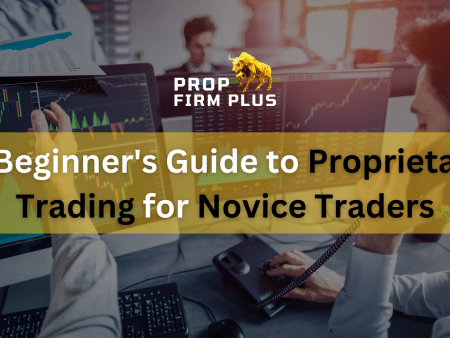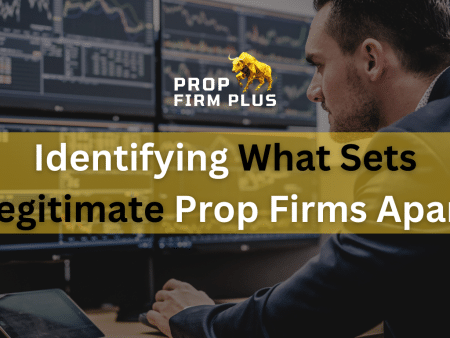
Selecting between a brokerage and a prop trading firm is crucial when determining where to trade. This choice is based on your unique trading goals, style, and capital availability.
Brokerages give you more freedom by allowing you to trade using your own money. On the other hand, they frequently need a large initial investment to hold holdings. Prop trading firms, on the other hand, provide traders with the capital of the firm to trade with, usually in return for a cut of the earnings. They remove obstacles to admission and provide access to more resources.
For people with the necessary talent but insufficient wealth to fulfill typical brokers’ financial thresholds, the prop trading approach is appealing. Profit-sharing and maybe less control over trading decisions are two conditions that come with using someone else’s money to trade, despite the allure of doing so. Conversely, brokers provide simple market access, but frequently at the expense of increased trading risks and expenses.
What to Consider
- Your trading autonomy and capital requirements are impacted by your choice between a broker and prop firm.
- Brokers give greater control over trades, while prop firms supply resources and funds in exchange for a cut of the profits.
- When choosing the best platform for trading activity, it is essential to evaluate your trading skills and risk tolerance.
Brokers vs Prop Firms
The two primary trading options available to you when navigating the financial markets are brokers and proprietary (prop) trading firms. Knowing the part each plays will help you decide which approach best suits your trading objectives.
What is a Broker?
A broker serves as an intermediary between the financial market and you. Retail brokers provide access to key markets such as stocks, futures and commodities, and serve a wide spectrum of clients, including experienced traders. You use your own money when you trade through a retail broker.
Brokers provide an additional degree of security for your trades because they are typically licensed and governed by regulations. You can use trading platforms offered by trading firms that act as brokers to purchase and sell assets in the stock market and other financial markets.
What is a Proprietary Trading Firm?
On the other hand, you can trade using the firm’s capital if you work with a proprietary trading firm, or prop firm. As a result, funded traders can use more leverage in their operations without having to make a big personal commitment. Prop trading firms take on the risk in exchange for a cut of the earnings.
Prop trading firms, such as Topstep, typically give you access to cutting-edge trading instruments and educational materials in an effort to promote successful trading techniques. Prop firms come with specific restrictions and risk considerations that may not be suitable for every trader, even if they may provide larger profit potential.
Evaluating Capital and Profit Models
It’s critical to comprehend how brokers and prop trading firms approach capital access and profit models when making your decision. You can use this knowledge to decide which choice best suits your trading style and financial objectives.
Capital Access and Leverage
You can access the funds of the company by working with a proprietary trading firm. This implies that you have access to funded trading using leverage, which is money that is more than your own.
Prop firms might differ greatly in terms of capital access; some can provide substantial leverage that boosts your market buying power. With this arrangement, you can trade with funds without having to risk any of your own money, but you have to follow the firm’s risk management procedures to safeguard their investment.
Conversely, brokers usually provide you with leverage in proportion to the amount of your own money that you deposit. This can fall short of what prop firms provide. Since you are trading primarily with your own capital, brokers typically do not offer the same degree of funded trading accounts, which may limit your ability to make large-scale trades in comparison to the backing of a prop business.
Profit Structure and Sharing
One important factor to consider when assessing prop trading firms is the profit share. Usually, you are entitled to a portion of the profits you make from trading the company’s capital as a prop trader.
This proportion can fluctuate; for really successful traders, it can be as high as 90/10 in your favor. It typically starts at about a 50/50 split. Be advised that some commissions and fees may apply to your earnings; these should be carefully weighed against the possibility of making a profit.
Your profit is yours to retain when using a broker, less any transaction costs and commissions. Although this may seem attractive, keep in mind that your overall profits could be reduced as a result of decreased purchasing power and the lack of further funding from prop firms. Brokers often operate on a commission-based business model, meaning that regardless of your level of success, they will profit from your trading activity.
Analyzing Costs and Resources
Your trading career will be greatly impacted by your choice between a prop trading firm and a broker; therefore, you must make sure to understand the specifics of the fees and conditions involved.
Trading Costs and Fees
You usually pay commission fees for trades when trading with brokers, and these fees can change based on the kind of asset you are trading with and the volume of trades you make. In addition, a fixed monthly desk fee may be assessed to you, independent of the volume or performance of your trading.
Prop trading firms, on the other hand, could demand that you split a portion of your earnings, typically between 10% and 20%. These businesses may also request a one-time capital deposit. They frequently supply the capital you use to trade, though, and it can grow in accordance with your performance without incurring further commission fees.
Educational and Technological Support
Brokers often provide the platforms and trading tools needed to complete trades, but they might not have comprehensive educational materials.
You may be able to get market statistics and some basic instructions online, but you may need to search elsewhere for more in-depth instruction and mentoring.
Prop trading companies frequently place a high priority on education, providing videos, tutorials, and organized training courses aimed at improving your trading abilities. Modern technology and access to support personnel for tactical and strategic help may also be offered by these companies.
The Emphasis of Proper Research and Instruments
Your trading efficiency may vary greatly depending on the availability and caliber of research and trading tools.
Brokers usually provide access to a range of data and tools for market research, which are necessary for making well-informed trading decisions.
Prop trading firms typically provide their traders with sophisticated databases and specialized tools, enabling a great deal of data analysis. The platforms and tools offered are essential for carrying out complex trading methods, which can be quite advantageous.
Evaluating Risk and Skill Factors in Trading
It’s important to realize that risk management techniques and ongoing skill improvement are the keys to trading success before delving into the intricacies of brokers or proprietary trading organizations. Both are important components of your trading journey, and your ability to master them will determine whether you prefer a prop company setup or a broker.
Tactics for Risk Management
Whether you choose to trade with a broker or join a prop trading firm, risk management is the key to successful trading. In order to reduce possible losses, trading parameters must be defined.
Consider specific tactics, including diversifying your trading portfolio, keeping a clear risk-reward ratio, and placing stop-loss orders. Maintaining consistency and focus in your trading operations requires discipline in following these tactics.
Develop Your Trading Skills
A combination of knowledge, real-world experience, and mental toughness goes into developing trading skills.
To enhance your abilities:
- Constant Learning: Remain current on analysis and market trends. To improve your tactics, spend money on education and training.
- Prop Firm Challenge: Complete simulated tasks prior to going live. These will put your ability to take calculated risks and make decisions in a safe setting to the test.
- Emotional Regulation: Acquire an acute awareness of your emotional terrain. Trading calls for a cool-headed strategy that can test your self-control and concentration under duress.










